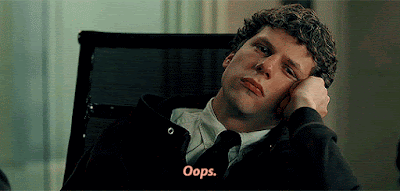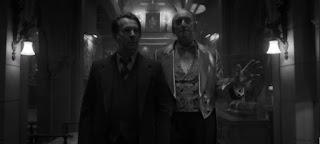Wednesday, February 21, 2024
The Social Network
"Saving Facebook" ("Every Creation-Myth Needs a Devil")
or
"There's Somethin' Happenin' Here (What It Is Ain't Exactly Clear)"
"O wonder!
How many goodly creatures are there here!
How beautious mankind is!
O brave new world,
That has such people in't!" (The Tempest, Act V, Scene 1)
Maybe it is too early to make a movie about Facebook (out of MySpace and Friendster) and the ramifications of our Brave New World of cyber-relationships. Maybe it is a little too "street-corner sage" to predict The End of the World As We are Sorta Familiar With it (But Not Really...More Acquaintances, Really). But, it is interesting to see a story about the Frankenstein behind the Monster, if only to see how each reflects the other.
And even though we're secretly rooting for The Monster.
And, at this point in time, there isn't a better team to make The Social Network than Aaron Sorkin and David Fincher. Sorkin, the mad savant behind some of the better TV shows of the past decade and a half, has always written about people and their "issues," and how personality impacts policy. Fincher has matured from an ILM tech (who was happy to fly cameras through coffee-maker grips**) to an intricate observer of societal pressures on the psyche. For the two of them to make this particular story is a Friend Invitation made in Hollywood Heaven. "Accept" it. But, you can't "Ignore" it.The movie begins with a date going badly between Mark Zuckerberg (Jesse Eisenberg, late of many movies with "...land" in the title) Harvard wall-flower, and Erica Albright (Rooney Mara—she'll play Lisbeth Salander opposite Daniel Craig in Fincher's big-budget version of The Girl with the Dragon Tattoo), an acquaintance. Anyone familiar with the machine-gun dialogue that writer Sorkin is known for, had better duck for cover—or wait for this on DVD so you can...play...it...slooooowly—for he now has an automatic weapon for a word-processor, and a co-conspirator in Eisenberg who can milk every nuance out of a line, despite hyperventilating it at debate-competition speed. His Zuckerberg is a "no Dolby/no squelch" type of unreadable conscience, and Eisenberg plays it with a deadness behind the eyes that interprets the world as a problem, if not necessarily a challenge. He's a bit too candid for a first date, and she stomps off, which sends him on a mission, simultaneously trashing her on his blog (LiveJournal) and culling the pictures of every woman on campus to create a "Who's Hotter" web-competition that becomes so popular so instantly that it crashes Harvard's web-infrastructure. He becomes both famous and infamous for the stunt, guaranteeing he'll never get a date in college, and attracting the wrath of the college's board, and the interest of two preppies attempting to create an exclusionary social network on the web. He goes them several steps better, making a system open to everyone on campus that trumps their attempts, and as it gains "friends," expands throughout the college system.Hindsight is 20/20, and Sorkin constructs the film as a series of depositions after the fact (of Facebook's success) as everyone who thinks they've been burned by Zuckerberg testifies to his vague promises and dealings under the table.*** Of course, they have every right to sue—but they'd only sue if "The Facebook" was a success—and the underpinnings and double-dealings don't resemble a fight for satisfaction, or a Noble Quest, so much as resembling a snake eating its own tail. ****Which brings us back to Frankenstein and his Monster. The film itself is expertly done—it is a complicated story of hidden motivations and the presentation of masks before public faces—and Sorkin and Fincher manage to navigate us through the maze of the story, even though one feels there is no cheese at the end. The experience is a bit hollow, which may be a part of the point.
Because the Facebook experience is hollow, as well. As hollow as Zuckerberg, as portrayed in this film, is. While it is nice that one has the opportunity to "re-connect" with old friends in a virtual environment and satisfy everyone's need to (as one friend commented on blogging) "talk about what you had for lunch," one wonders why one has to re-connect at all...especially if the relationship wasn't maintained in the first place. Not enough time in the world to meet? Because a "real" relationship takes time, takes effort, "gets messy?" Facebook provides the illusion of "staying in touch," without actually touching. Like Zuckerberg's abortive "date," a lot of time is spent broadcasting, but not interacting. There are, of course, exceptions. But the fact of the matter is Facebook's cyber-community is not a "Brave New World" at all. Just the opposite. It provides a substitute in lieu of commitment. A panacea in a life thought to be full to bursting and without risk. The most precious commodity we can give is time—slices of our lives and our selves. Facebook is a pacifier—a mass-Hallmark card that we can spend a few heart-beats picking out, and send away without a thought and not even sweat the cost of a stamp.
It soon becomes a numbers game—a collection, like the celebration of the 1,000,000th friend portrayed in the film. But who are those million people? Facebook doesn't know or care. It's just a number. A number of casual relationships, that may lead to something else, but probably won't. A collection, nice to look at, but more often, ignored. Trophies, and ones that don't need to be polished or buffed up.
It's a new world of blithely arrested development, in the image of its creator, where love and commitment do not compute, and the only thing close to it is "hope"—translatable as keystroke F5.
* Except for some dodgy freezing breath-work, the biggest special effect will be invisible to you until the closing credits. Nice.
** Personally, I'd like to get back all those hours spent on "ZooWorld."
*** An image that kept coming to mind every time I thought of writing this review, where it would subsequently be published...on B/C-L's's Facebook page.
Tuesday, November 28, 2023
The Killer (2023)
"I blame you...for having to bring my work home," he muses at one point.
Ultimately, it's a revenge movie—his clients don't like the outcome of the job he was hired for and so they go after him—and he has to methodically go up the chain, finding his contact, finding out his contacts, and taking them out one by one. He finds out "who", but the "why" is a bit of a mystery, unless you ascribe his own philosophy to their motivations: "From the beginning of history, the few have always exploited the many. This is the cornerstone of civilization. The blood and mortar that binds all bricks. Whatever it takes, make sure you're one of the few, not one of the many." And so he goes about his business. Whatever it takes.Fincher's direction is full of his feints and slights of hand—the time-transitions in a cut, the "impossible" shots (he did start out in special effects and he's in his wheel-house in a CGI-world—see the video below), all carefully controlled, composed and edited with a distinctive *snap* to them. It all looks simple, but what it takes to achieve that effect is extraordinarily complicated. That it's in service to another "revenge" plot is a bit disheartening. That it's something Fincher has wanted to make for years is more than a little depressing.Fincher is such a craftsman, that he shouldn't be punching down. Maybe he had an extra commitment to Netflix for making Mank. Maybe he wanted to see if he could curb his instincts for budget and length and make something spare with both. Maybe the option to the graphic novel's film-rights were going to lapse. Or maybe this is his attempt to make a comedy ( although I've always considered Fincher's Fight Club more of a comedy) with its assassin who seems to have grown his habit for internal monologue watching "Dexter." Maybe it's his way of making a "John Wick" movie (why you'd want to, aside from the absurdity of it, escapes me). But, this is more This Gun For Hire than Le Samouraï.
Sunday, July 11, 2021
Don't Make a Scene: Mank
The Story: Publisher William Randolph Hearst puts Screenwriter Herman J. Mankiewicz in his place, literally and figuratively.
In Mank, David Fincher's realization of his father's screenplay about the writing of the movie Citizen Kane, the relationship between Hearst and his mistress, Marion Davies, and Mankiewicz is background, a significant part of his life that informed the formation of the project which he'd conceptualized with the title "American." Davies and Mank knew each other through Charles Lederer, her nephew and a screenwriting pal of Mank's. As a result, Mankiewicz started to accompany Lederer on weekend trips to Hearst's castle, "La Cuesta Encantada," in San Simeon, California. Hearst and Mank became gossipy friends—Mankiewicz was renowned for his wit, and it was what attracted Welles, as well. But, he was also an alcoholic, and...those trips stopped happening.
Mank speculates that Mankiewicz's cozy relationship was soured by his seeing Hearst's and M-G-M head Louis B. Mayer's use of the studio to orchestrate a smear campaign against 1934 gubernatorial candidate Upton Sinclair, a progressive. And when Sinclair lost, Mank, in his disappointment as well as in his cups, takes his bitterness out on the power-brokers. That doesn't play well. And his wit doesn't save him from the consequences and the very expensive rug is pulled out from under him. Righteous indignation may be personally satisfying, but it has penalties, no matter how righteous.
And that's when the Parable of the Organ-Grinder's Monkey comes in. I've briefly talked about the ironies of Mank (in my review of it) and another telling little example of Welles' influence is the insertion of a fable which casts a shadow on the tale—something he did in Mr. Arkadin and The Trial. The Parable of the Organ-Grinder's Monkey is a lesson in perception and how it can be wrong; the monkey assumes that he's the one in power, given the attention paid to it, rather than the reality of it being merely a distraction, a small—and rather helpless—participant. The chain around his neck may be made of gold. But, it's still a chain. Without it, and without the accoutrements provided the monkey, he's just a monkey...of no particular worth.
And with that metaphorical rejoinder (to Mankiewicz's own), Hearst lets him know who's in charge, and shows him the door. End of story. End of the party. End of the relationship.
End of lesson.
The Set-Up: In flashback, as he's about to confront Orson Welles (Tom Burke) about receiving a writing credit for his script "American," Herman J. Mankiewicz (Gary Oldman) recalls his final meeting with William Randolph Hearst (Charles Dance). At one of Hearst's elaborate costume parties, Mankiewicz has gotten drunk—drunker than usual—and he talks about a story he wants to write, one that is a fanciful metaphor for the host. It does not go over well, and after Mankiewicz vomits on the floor, the guests scatter, leaving Mankiewicz alone with his host. The party's over.
Action.
INT. SAN SIMEON - NIGHT - (FLASHBACK - CONT'D) 79
HEARST Mank, Mank...
MANK What I said - was more in sorrow than in anger, Willie.
It's dead still. The two men alone in the room. HEARST crosses to MANK, and putting a fatherly hand on his shoulder, turns and guides him toward the exit.
HEARST Are you familiar... HEARST ...with the parable of the...HEARST ...organ-grinder's monkey?HEARST Now, the organ-grinder's monkey is tiny in stature,
MANK (softening blow) Wha- Willie -
As they reach the front door:
EXT. SAN SIMEON - NIGHT
HEARST as he eases MANK out.
HEARST And every time I do decide to dance -






































































